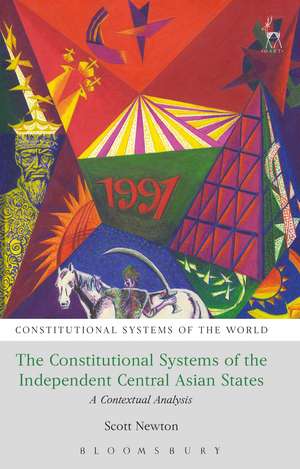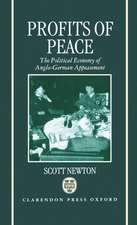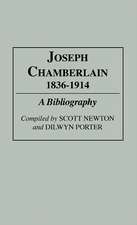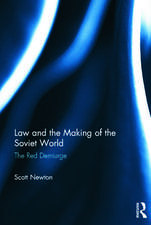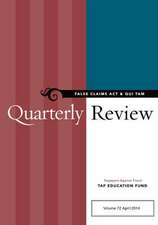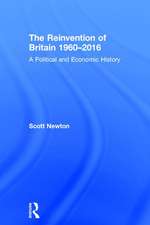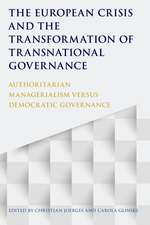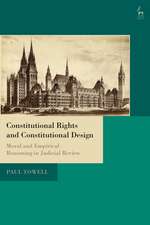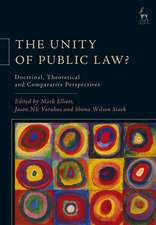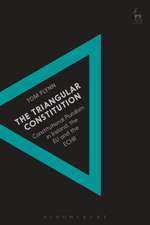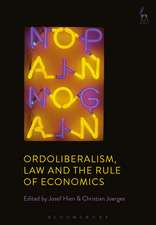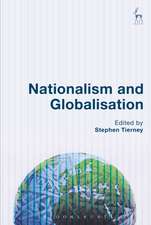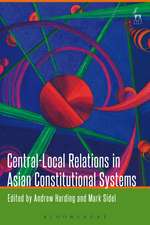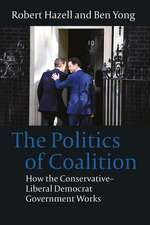The Constitutional Systems of the Independent Central Asian States: A Contextual Analysis: Constitutional Systems of the World
Autor Scott Newtonen Limba Engleză Paperback – 31 oct 2018
| Toate formatele și edițiile | Preț | Express |
|---|---|---|
| Paperback (1) | 300.14 lei 6-8 săpt. | |
| Bloomsbury Publishing – 31 oct 2018 | 300.14 lei 6-8 săpt. | |
| Hardback (1) | 570.43 lei 6-8 săpt. | |
| Bloomsbury Publishing – 22 feb 2017 | 570.43 lei 6-8 săpt. |
Din seria Constitutional Systems of the World
- 13%
 Preț: 174.07 lei
Preț: 174.07 lei - 38%
 Preț: 134.64 lei
Preț: 134.64 lei - 23%
 Preț: 197.68 lei
Preț: 197.68 lei - 14%
 Preț: 147.59 lei
Preț: 147.59 lei - 34%
 Preț: 509.52 lei
Preț: 509.52 lei - 28%
 Preț: 374.41 lei
Preț: 374.41 lei - 40%
 Preț: 466.81 lei
Preț: 466.81 lei - 22%
 Preț: 263.72 lei
Preț: 263.72 lei - 23%
 Preț: 185.93 lei
Preț: 185.93 lei - 19%
 Preț: 166.82 lei
Preț: 166.82 lei - 23%
 Preț: 152.82 lei
Preț: 152.82 lei - 21%
 Preț: 218.26 lei
Preț: 218.26 lei - 23%
 Preț: 178.47 lei
Preț: 178.47 lei - 19%
 Preț: 303.62 lei
Preț: 303.62 lei - 30%
 Preț: 510.03 lei
Preț: 510.03 lei - 14%
 Preț: 192.30 lei
Preț: 192.30 lei - 18%
 Preț: 304.66 lei
Preț: 304.66 lei - 23%
 Preț: 178.02 lei
Preț: 178.02 lei - 18%
 Preț: 225.31 lei
Preț: 225.31 lei - 23%
 Preț: 197.14 lei
Preț: 197.14 lei - 18%
 Preț: 180.44 lei
Preț: 180.44 lei - 18%
 Preț: 179.98 lei
Preț: 179.98 lei - 18%
 Preț: 186.35 lei
Preț: 186.35 lei - 14%
 Preț: 179.00 lei
Preț: 179.00 lei - 16%
 Preț: 218.47 lei
Preț: 218.47 lei - 19%
 Preț: 184.14 lei
Preț: 184.14 lei - 18%
 Preț: 297.58 lei
Preț: 297.58 lei - 16%
 Preț: 218.00 lei
Preț: 218.00 lei - 18%
 Preț: 232.54 lei
Preț: 232.54 lei - 23%
 Preț: 171.85 lei
Preț: 171.85 lei - 18%
 Preț: 225.49 lei
Preț: 225.49 lei - 14%
 Preț: 185.93 lei
Preț: 185.93 lei - 13%
 Preț: 230.79 lei
Preț: 230.79 lei - 13%
 Preț: 186.10 lei
Preț: 186.10 lei - 19%
 Preț: 179.10 lei
Preț: 179.10 lei -
 Preț: 223.20 lei
Preț: 223.20 lei - 18%
 Preț: 180.44 lei
Preț: 180.44 lei -
 Preț: 217.09 lei
Preț: 217.09 lei - 18%
 Preț: 186.35 lei
Preț: 186.35 lei
Preț: 300.14 lei
Preț vechi: 366.06 lei
-18% Nou
Puncte Express: 450
Preț estimativ în valută:
57.43€ • 59.96$ • 47.53£
57.43€ • 59.96$ • 47.53£
Carte tipărită la comandă
Livrare economică 05-19 aprilie
Preluare comenzi: 021 569.72.76
Specificații
ISBN-13: 9781509928453
ISBN-10: 1509928456
Pagini: 368
Dimensiuni: 138 x 216 mm
Greutate: 0.45 kg
Editura: Bloomsbury Publishing
Colecția Hart Publishing
Seria Constitutional Systems of the World
Locul publicării:London, United Kingdom
ISBN-10: 1509928456
Pagini: 368
Dimensiuni: 138 x 216 mm
Greutate: 0.45 kg
Editura: Bloomsbury Publishing
Colecția Hart Publishing
Seria Constitutional Systems of the World
Locul publicării:London, United Kingdom
Caracteristici
The author has undertaken the first comparative constitutional analysis of the Kyrgyz Republic and Republics of Kazakhstan, Turkmenistan, Uzbekistan, and Tajikistan in their cultural, historical, political, economic and social context.
Notă biografică
Scott Newton has held the Laws of Central Asia post at SOAS since 1999. Over 20 years he has lived, worked, and conducted research in all five countries that are the subject of this volume.
Cuprins
INTRODUCTIONFirst Principles: Constitutional Orders, Constitutional Functions, Constitutional Processes Methodology and Schools of Thought Plan of the Work Further Reading 1. CONSTITUTIONAL OVERVIEW: LIE OF THE 'STANS Uzbekistan Turkmenistan Kazakhstan Tajikistan KyrgyzstanFurther Reading 2. RED ORIGINS: DOING JUSTICE TO SOVIET CONSTITUTIONALISM Soviet Constitutional Order Soviet Authority (CPSU) Soviet Federalism and Nationalities Regulation Soviet Government Soviet Planning and Ownership Soviet Social Regulation and Protection Soviet Rights Protection Soviet Ideology Soviet Local Variation Constitutional Order and the Constitution Soviet Constitutional Problems and Solutions Further Reading 3. NATAL CHART: CONSTITUENT INFLUENCES AND PROCESSES The Post-Soviet Moment and the Exigency of Sovereignty The Constituent Process and the Texts Themselves Property, The Market and Welfare Culture and Constitution Transition Tutelage: Good Governance, Rule of Law, Democratisation Conclusion Further Reading 4. SUPER-PRESIDENTS AND SUPERPOWERS Imbalance of Power Presidential Particulars: Presidency and President Presidential Power: Government and its Subordinate Agencies; Local Administration Presidential Power: Parliament Presidential Power: Judicial StructuresPresidential Power: Elections/Referenda Presidential Power: Administration/Apparat and Directly Subordinate Agencies Presidential Power: National Security Presidential Power: Lawmaking Immunity and Impeachment Doing Justice to Super-presidentialism Further Reading 5. TALKING SHOP OR GOVERNING BODY: PARLIAMENT Parliamentary Basics: Composition, Parliamentarians and Parties Parliament as Institution: Structure, Leadership, Development Parliamentary Powers: Lawmaking Other Parliamentary PowersThe Meta-rules of Representation Elections and Term of Office A Tale of Two Parliaments, and Two Constitutions:Tajik and Kyrgyz Further Reading 6. HONOUR IN THE BREACH: RIGHTS, COURTS AND JUSTICE Constitutional Role and Functions of the Central Asian Judiciaries Constitutional Evolution of the Central Asian Judiciaries Governance: Judicial Personnel Management and Court Administration Structure and Functions: The Five Court Systems Constitutional Basis of the Central Asian Justice System: Internal Affairs, Justice and the Procuracy Rights and Remedies Judicial Protection International Protection Supplementary Protection: Procuracy and Human Rights Institutions Further Reading 7. PLAN TO CLAN: TRANSITIONS, ECONOMIC AND SOCIAL Constitutional Regulation of the Economy: Basic Rules Constitutional Regulation of the Economy: Basic Institutions Economic Constitutionalism: Foreign Investment and International Integration The 'Material Constitution': Crony Capitalism, Corruption, Crime Social Provision and Protections (Pensions, Unemployment, Poverty, Gender) Further Reading 8. CENTRAL ASIA CONSTITUTIONS AND CENTRAL ASIAN DIFFERENCE: THE REGULATION OF PLURALISM Identity: Who, the People? Citizenship and Ethnicity ('Nationality') Federalism, Devolution LanguageCulture Religion Local and Regional Government Further Reading
Recenzii
It is the single comprehensive and erudite overview of constitutional frameworks of the entire Central Asian region and it should be read by everyone who has interest in the politics and constitutions of the respective states. It is, ultimately, a must read for scholars interested in constitutions in authoritarian regimes, a field of constitutional studies which has by and large overlooked Central Asia, for no compelling reason.
... this volume is a welcome, impressive, and perceptive addition to the comparative law of the Commonwealth of Independent States.
Newton's storytelling reveals profound curiosity, deep understanding, a sense of empathy, and, occasionally, a sense of disquiet... Superbly executed and absorbing, the book compels this reader to agree with the author that the Central Asian experience is emblematic of the tensions and issues contemporary constitutional orders face everywhere.
... this volume is a welcome, impressive, and perceptive addition to the comparative law of the Commonwealth of Independent States.
Newton's storytelling reveals profound curiosity, deep understanding, a sense of empathy, and, occasionally, a sense of disquiet... Superbly executed and absorbing, the book compels this reader to agree with the author that the Central Asian experience is emblematic of the tensions and issues contemporary constitutional orders face everywhere.
